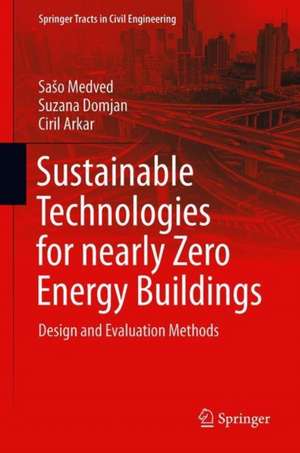Sustainable Technologies for Nearly Zero Energy Buildings: Design and Evaluation Methods: Springer Tracts in Civil Engineering
Autor Sašo Medved, Suzana Domjan, Ciril Arkaren Limba Engleză Hardback – 11 feb 2019
Din seria Springer Tracts in Civil Engineering
- 18%
 Preț: 1234.00 lei
Preț: 1234.00 lei -
 Preț: 256.15 lei
Preț: 256.15 lei - 18%
 Preț: 787.15 lei
Preț: 787.15 lei - 15%
 Preț: 590.95 lei
Preț: 590.95 lei - 18%
 Preț: 1117.82 lei
Preț: 1117.82 lei - 15%
 Preț: 595.86 lei
Preț: 595.86 lei - 18%
 Preț: 1023.35 lei
Preț: 1023.35 lei - 20%
 Preț: 754.34 lei
Preț: 754.34 lei - 18%
 Preț: 1122.56 lei
Preț: 1122.56 lei - 18%
 Preț: 726.37 lei
Preț: 726.37 lei - 18%
 Preț: 1120.99 lei
Preț: 1120.99 lei - 18%
 Preț: 956.03 lei
Preț: 956.03 lei - 18%
 Preț: 1579.49 lei
Preț: 1579.49 lei - 15%
 Preț: 645.79 lei
Preț: 645.79 lei - 18%
 Preț: 1119.38 lei
Preț: 1119.38 lei - 18%
 Preț: 1121.55 lei
Preț: 1121.55 lei - 18%
 Preț: 1614.21 lei
Preț: 1614.21 lei - 18%
 Preț: 1002.75 lei
Preț: 1002.75 lei - 15%
 Preț: 640.24 lei
Preț: 640.24 lei - 18%
 Preț: 954.62 lei
Preț: 954.62 lei - 18%
 Preț: 1113.71 lei
Preț: 1113.71 lei - 18%
 Preț: 948.47 lei
Preț: 948.47 lei - 15%
 Preț: 645.47 lei
Preț: 645.47 lei - 15%
 Preț: 667.86 lei
Preț: 667.86 lei - 18%
 Preț: 1225.31 lei
Preț: 1225.31 lei - 18%
 Preț: 960.42 lei
Preț: 960.42 lei - 18%
 Preț: 947.04 lei
Preț: 947.04 lei - 18%
 Preț: 1024.08 lei
Preț: 1024.08 lei - 15%
 Preț: 643.48 lei
Preț: 643.48 lei - 15%
 Preț: 636.45 lei
Preț: 636.45 lei - 18%
 Preț: 1383.00 lei
Preț: 1383.00 lei - 15%
 Preț: 597.26 lei
Preț: 597.26 lei - 18%
 Preț: 1416.12 lei
Preț: 1416.12 lei - 18%
 Preț: 1003.70 lei
Preț: 1003.70 lei - 18%
 Preț: 975.92 lei
Preț: 975.92 lei - 18%
 Preț: 1012.84 lei
Preț: 1012.84 lei - 15%
 Preț: 586.05 lei
Preț: 586.05 lei - 18%
 Preț: 1241.25 lei
Preț: 1241.25 lei - 15%
 Preț: 606.82 lei
Preț: 606.82 lei - 15%
 Preț: 581.65 lei
Preț: 581.65 lei - 15%
 Preț: 522.56 lei
Preț: 522.56 lei - 18%
 Preț: 1025.79 lei
Preț: 1025.79 lei - 18%
 Preț: 944.82 lei
Preț: 944.82 lei
Preț: 1119.24 lei
Preț vechi: 1364.93 lei
-18% Nou
Puncte Express: 1679
Preț estimativ în valută:
214.16€ • 223.60$ • 177.25£
214.16€ • 223.60$ • 177.25£
Carte tipărită la comandă
Livrare economică 04-18 aprilie
Preluare comenzi: 021 569.72.76
Specificații
ISBN-13: 9783030028213
ISBN-10: 3030028216
Pagini: 328
Ilustrații: XV, 388 p. 479 illus., 341 illus. in color.
Dimensiuni: 155 x 235 x 30 mm
Greutate: 0.74 kg
Ediția:1st ed. 2019
Editura: Springer International Publishing
Colecția Springer
Seria Springer Tracts in Civil Engineering
Locul publicării:Cham, Switzerland
ISBN-10: 3030028216
Pagini: 328
Ilustrații: XV, 388 p. 479 illus., 341 illus. in color.
Dimensiuni: 155 x 235 x 30 mm
Greutate: 0.74 kg
Ediția:1st ed. 2019
Editura: Springer International Publishing
Colecția Springer
Seria Springer Tracts in Civil Engineering
Locul publicării:Cham, Switzerland
Cuprins
Indoor comfort requirements .- Energy sources.- Introduction to building physics.- Experimental evaluation of buildings’ envelope thermal properties.- Global climate and energy performance of the building.- Best available technologies (BAT) for on-site and nearby generation of heat for nZEB .- Best available technologies (BAT) for on-site electricity generation for nZEB.- Space heating of nZEB.- Space cooling of nZEB.- Domestic hot water heating in nZEB.- Ventilation of nZEB.- Energy efficient lighting of nZEB.- Energy labelling of buildings.- Environmental labelling of buildings.
Notă biografică
Sašo Medved is full professor and head of the Laboratory for Sustainable Technologies in Buildings at the University of Ljubljana, Slovenia. His research focuses on transformation of renewable energy sources, environmental engineering, building physics, the heat and mass transfer in urban environments, mitigating climate change.
Textul de pe ultima copertă
This book presents cutting-edge work on the energy efficiency and environmental sustainability of buildings, examining EU policies, regulations and technologies for complex systems such as passive buildings, sustainable buildings and, as part of the Energy Performance of Building Directive (EPBD), nearly Zero Energy Buildings (nZEB) requirements. It explores a wide range of topics, including indoor environment requirements, building physics, in-situ experiments to determine the thermal properties of buildings, nZEB requirements, building service technology, and methods of evaluating energy efficiency and environmental impacts. It also provides an overview of the best available technologies for nZEB, including those for the rational use of energy, utilization of renewable energy sources, EPBD systems and calculation methods. This book is a valuable resource for students, researchers and practitioners of urban planning, and architecture, civil and mechanical engineering.
Caracteristici
Includes case studies and extended graphical presentations Provides theoretical and operative approaches to inspire policymakers and building planners Addresses the most challenging research issues related to energy efficiency, environmental sustainability and building physics
